Two front groups with connections to DTE Energy and Consumers Energy launched a Facebook ad campaign last week ahead of a possible vote on solar energy legislation. DTE Energy’s Alliance for Michigan Power and Consumers Energy’s Citizens for Energizing Michigan’s Economy appear to be coordinating for the first time in recent years. Together, the advertisements target Democratic Representatives John Cherry, Jim Haadsma, Donna Lasinski, Mari Manoogian, and Ranjeev Puri.
The legislation, HB 4236, would lift the cap on utility distributed generation programs. The state’s current cap is set at 1 percent of a utility’s in-state peak load. Both Upper Peninsula Power Company and Consumers Energy had agreed to double the 1 percent cap because of rooftop solar demand. Republican Reps. Ken Borton, John Damoose, Michele Hoitenga, Gary Howell, Steven Johnson, Gregory Markkanen, Brad Paquette, John Reilly, John Roth, and Douglas Wozniak are all co-sponsors of the legislation, along with Democrat Reps. Rachel Hood, Padma Kuppa, and Yousef Rabhi.
The advertisements that target the five Democratic representatives criticize “out-of-state” solar developers and claim that HB 4236 will raise the cost of electricity for everyone and undermine the state’s clean energy goals.
The House Energy Committee held a hearing on the bill in February. DTE Energy and Consumers Energy testified in opposition to the bill. Testifying in support, Michigan Environmental Council’s Charlotte Jameson said that there is no “economic or ratepayer reason to keep the cap” because the state eliminated the net metering program and replaced it with a tariff based on the cost of serving distributed solar customers. Chairman of the Michigan Public Service Commission Dan Scripps also testified. Scripps said while that the PSC is not taking a formal position on the bill they are “supportive in taking steps that ensure solar developers in Michigan are able to continue operating and thus support in concept the idea of lifting or eliminating the cap.” Scipps also said, “there is no engineering need for a system wide cap.”
Even if net metering rates were still in effect in Michigan, the Michigan utilities’ argument that solar customers did not pay their fair share of grid costs was always questionable. Data from the Department of Energy’s Lawrence Berkeley National Laboratory (LBNL) found that a cost shift from rooftop solar to non-solar customers does not occur until distributed solar penetration reaches 10% of electricity sales, and even then that the impact is minimal compared to other drivers of rate increases, like new gas plants or transmission lines.
The Consumers Energy front group is also running a misleading advertisement that claims “out-of-state special interests” caused the blackouts on the Texas electrical grid in February. There are ten active versions of this advertisement appearing on Facebook feeds in the legislators’ districts.
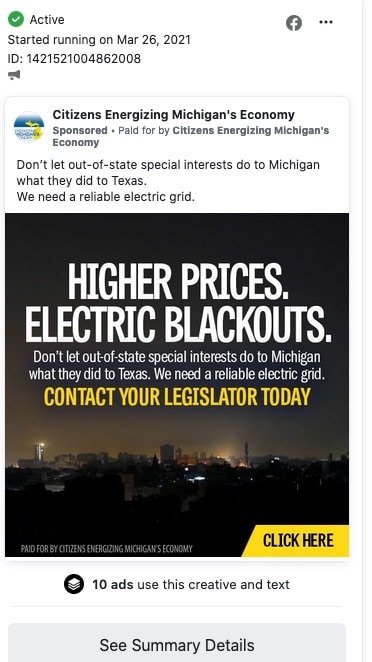
Utility companies in Texas – specifically Calpine, Vistra, and NRG Energy – all have said natural gas shortages affected their ability to operate their power plants. Additionally, the Texas Railroad Commission didn’t mandate winterization to prevent oil and gas wells from freezing and failed to ensure that gas producers and pipeline operators sought priority status for power during emergency outages, which occurred when the grid operator ordered utilities to perform rotating outages. Coal-fired power plants also failed to operate during the extreme weather event.
The advertisements also claim without evidence or explanation that lifting the cap on distributed energy subscribers will harm the state’s clean energy goals, even though Michigan’s renewable energy standard levels off this year at 15%.
Consumers Energy and DTE Energy have both pledged to reach “net-zero” carbon emissions, Consumers Energy by 2040 and DTE Energy by 2050; an analysis by the Sierra Club, however, gave the two utilities poor grades for their actual decarbonization actions after it examined their long-term energy plans. Sierra Club’s report, The Dirty Truth About Utility Climate Pledges, assigned a score to every utility based on its plans to retire coal, stop constructing new gas plants, and aggressively build out new clean energy by 2030. Consumers Energy received a C grade for its clean energy transition; DTE Electric received a D grade.
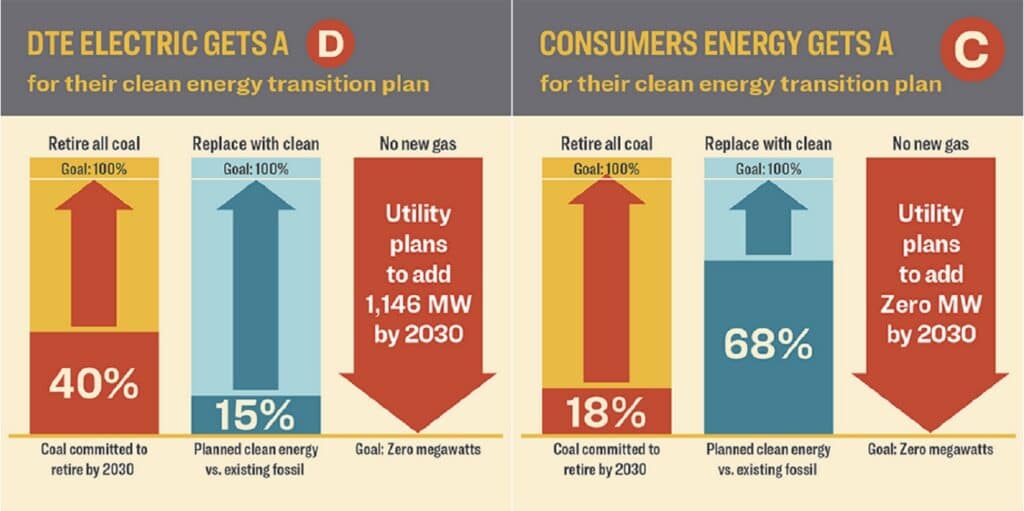
Deloitte released a similar report last year. The consulting firm also found “significant gaps” between many utilities’ net-zero commitments and their respective fossil fuel retirements and additions. The report also detailed how the utilities need to deploy considerably more renewable energy and energy storage, build transmission lines, and harness demand response and distributed solar generation to achieve net-zero goals. Speaking about rooftop solar capacity, the report said that utilities with net-zero goals “have harnessed only 9 GW out of a 400 GW potential in their territories.”
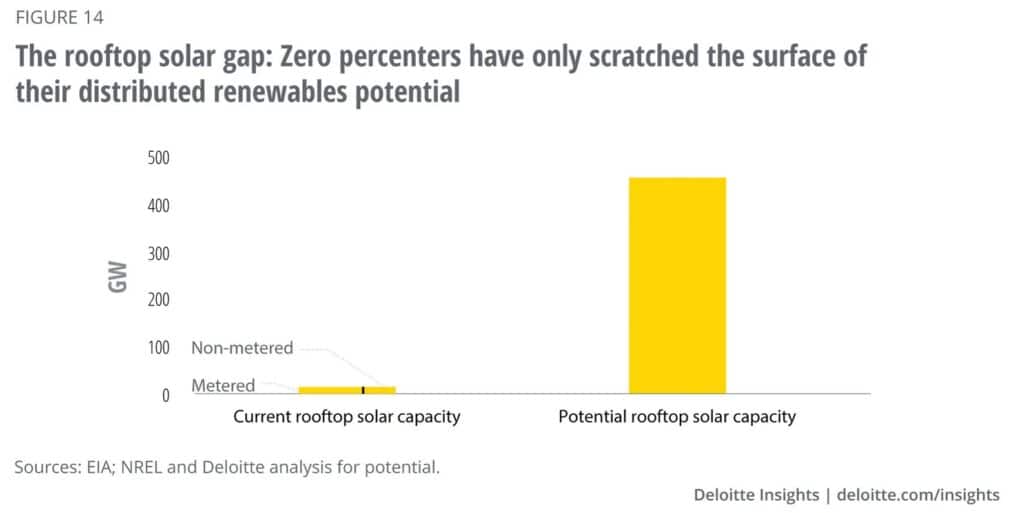
DTE, Consumers Energy wash their political advocacy through Alliance For Michigan Power, Citizens for Energizing Michigan’s Economy
Alliance For Michigan Power is an organization affiliated with DTE Energy. The group claims it is a “coalition of more than 30,000 Michiganders who know that reliable, affordable, and sustainable electricity is vital to Michigan’s future.” It originated from Michigan Energy First, another DTE-affiliated organization which incorporated in December 2014 and filed documents less than a year later to register Alliance For Michigan Power. Michigan Energy First’s president is DTE Energy’s Vice President of Corporate and Government Affairs Renze Hoeksema. The treasurer is Theresa Uzenski, a manager of regulatory accounting at DTE Energy. Another board director was a former DTE Energy Vice President of Corporate and Government Affairs.
In 2019, several articles detailed how DTE Energy was funding Detroit community leaders in an effort to present the appearance of public support for both the utility’s long-term energy plan and a proposal to severely reduce the compensation for rooftop solar customers under the new cost-of-service tariff program. Alliance For Michigan Power and another organization housed within it called Michigan Energy Promise were part of DTE’s campaign.
Citizens for Energizing Michigan’s Economy is a Consumers Energy-funded 501(c)(4) organization that spends hundreds of thousands of dollars on television and radio issue advertisements that praise state candidates ahead of primary and general elections. From 2014 through 2017, Consumers Energy has made over $43.5 million in political contributions to the organization. Consumers Energy’s Brandon Hofmeister, senior vice president of governmental, regulatory and public affairs, is also CEME’s vice president.
The $43.5 million that Consumers Energy has contributed to CEME is far more than the utility has reported in other political spending. It’s over 40 times greater than the total amount of money the utility’s PAC has contributed to Michigan candidates, or its total state lobbying expenditures, and is nearly 10 times larger than its federal government lobbying over the same four-year period. Although it is not known if Consumers Energy has contributed to CEME in since its $20 million contribution in 2017, the latest publicly available Form 990 for CEME showed that it still had over $20 million in total “net assets/fund balances” at the end of 2019.
This post was updated on March 31 to include PSC Chairman Dan Scripps’ testimony, and to correctly include Democrat Reps. Rachel Hood and Padma Kuppa as co-sponsors of HB 4236.


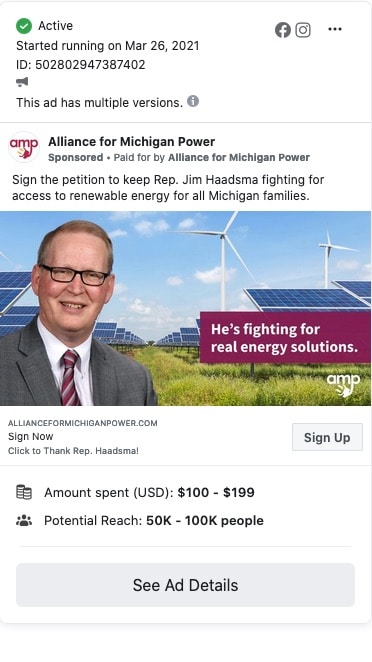
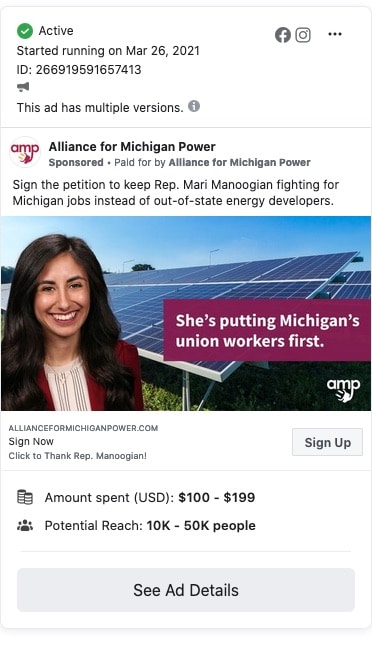
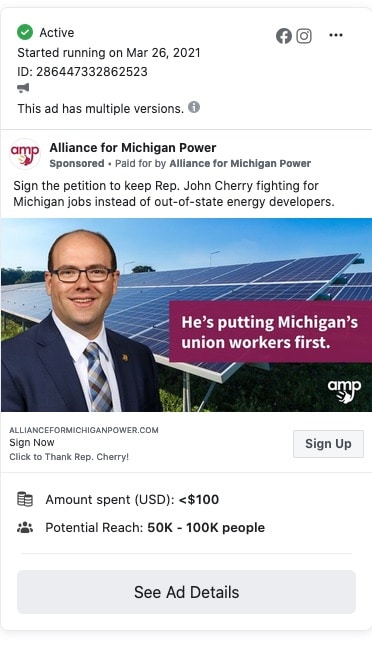
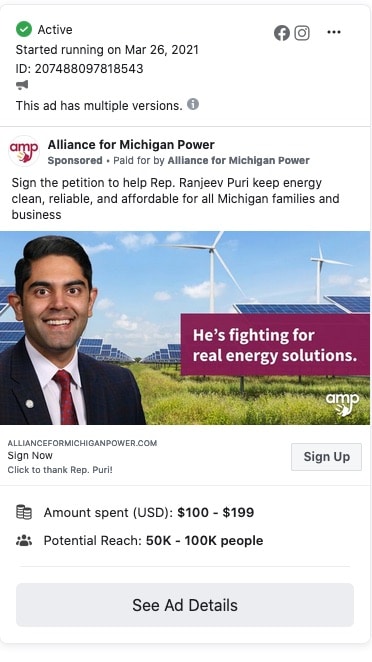
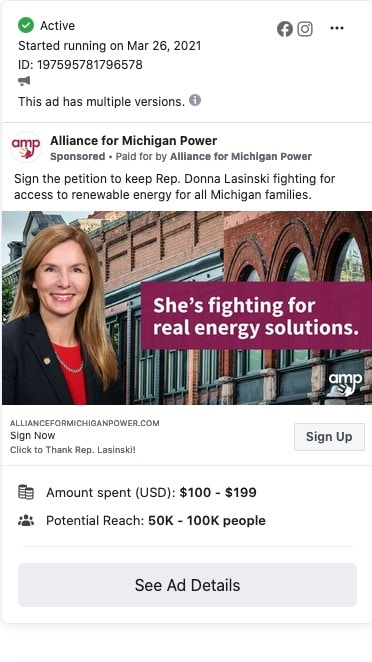
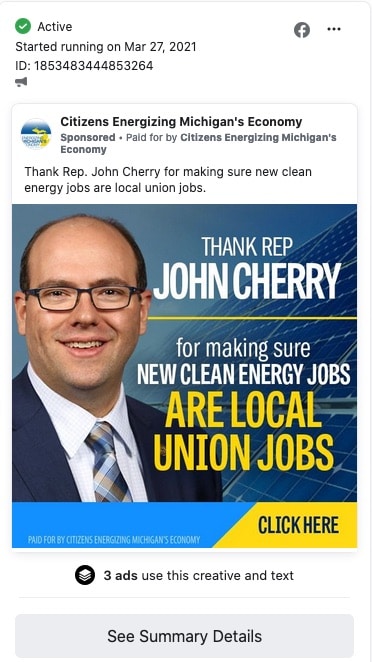
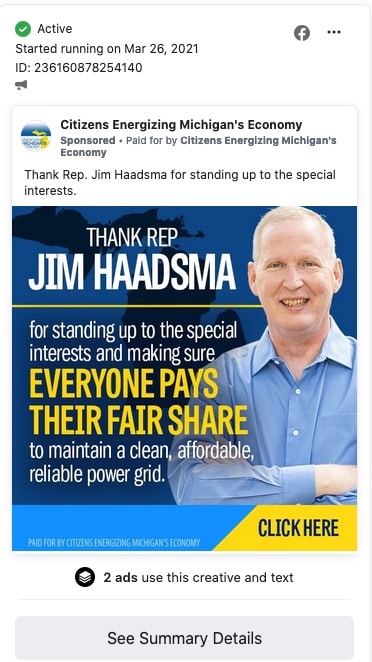
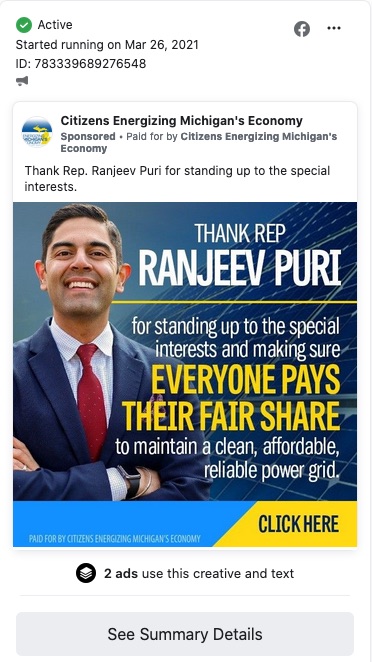
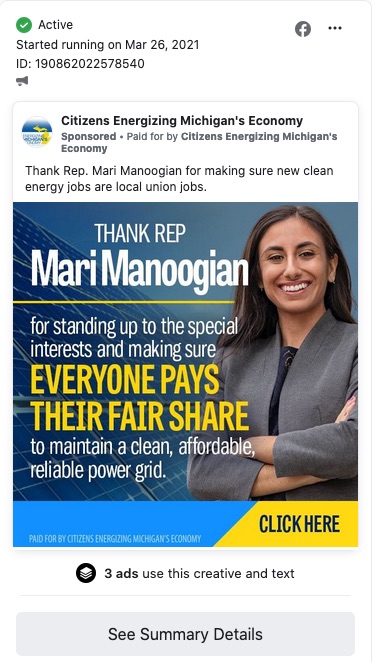
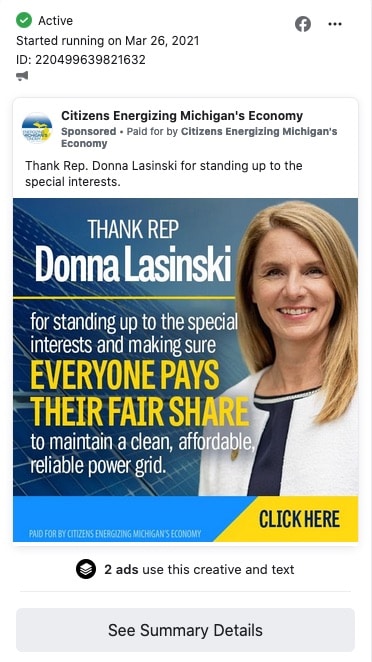
[…] full analysis is available from the Energy and Policy Institute. It shows that their digital ads specifically […]
[…] análisis publicitario del Energy and Policy Institute muestra que los anuncios, que aparecen principalmente en Facebook, […]
[…] & Policy Institute, a watchdog group, has reported that groups with ties to utilities are campaigning against the bill by saying it would lead to higher costs for customers who don’t have solar. Michigan, with 130 […]
[…] & Policy Institute, a watchdog group, has reported that groups with ties to utilities are campaigning against the bill by saying it would lead to higher costs for customers who don’t have solar. Michigan, with 130 […]
[…] can’t, within the limits of the state and US Constitutions, restrict DTE’s ability to fund disinformation campaigns or lobby against solar power, for example. Nor is there anything saying that municipalities and the state government at large […]
[…] Michigan. The state’s current cap is set at 1 percent of a utility’s in-state peak load. At a hearing on the bill, Michigan Public Service Commission Chairman Dan Scripps testified that “there is no […]
[…] consumer advocates who have frequently been at odds with energy committee leaders. DTE continues to fight bills that would remove Michigan’s arbitrary cap on distributed solar. In addition, the utility has […]
[…] legislators introduced a bill in 2021 to lift a cap on utility distributed generation programs, CEME ran a misleading ad that falsely claimed “out-of-state special interests” – implying solar companies – caused […]
[…] since it was created in 2014. Michigan Energy First has funded DTE allies in the state legislature, promoted the company’s interests on social media, funded community organizations whose leaders in turn […]
[…] since it was created in 2014. Michigan Energy First has funded DTE allies in the state legislature, promoted the company’s interests on social media, funded community organizations whose leaders in turn […]
[…] since it was created in 2014. Michigan Energy First has funded DTE allies in the state legislature, promoted the company’s interests on social media, funded community organizations whose leaders in turn […]
[…] since it was created in 2014. Michigan Energy First has funded DTE allies in the state legislature, promoted the company’s interests on social media, funded community organizations whose leaders in turn […]
[…] since it was created in 2014. Michigan Energy First has funded DTE allies in the state legislature, promoted the company’s interests on social media, funded community organizations whose leaders in turn […]
[…] since it was created in 2014. Michigan Energy First has funded DTE allies in the state legislature, promoted the company’s interests on social media, funded community organizations whose leaders in turn […]
[…] since it was created in 2014. Michigan Energy First has funded DTE allies in the state legislature, promoted the company’s interests on social media, funded community organizations whose leaders in turn […]
[…] since it was created in 2014. Michigan Energy First has funded DTE allies in the state legislature, promoted the company’s interests on social media, funded community organizations whose leaders in turn […]
[…] since it was created in 2014. Michigan Energy First has funded DTE allies in the state legislature, promoted the company’s interests on social media, funded community organizations whose leaders in turn […]
[…] since it was created in 2014. Michigan Energy First has funded DTE allies in the state legislature, promoted the company’s interests on social media, funded community organizations whose leaders in turn […]
[…] since it was created in 2014. Michigan Energy First has funded DTE allies in the state legislature, promoted the company’s interests on social media, funded community organizations whose leaders in turn […]
[…] it was created in 2014. Michigan Vitality First has funded DTE allies within the state legislature, be promoted the corporate’s pursuits on social media, funded community organizations whose chief in flip […]
[…] it was created in 2014. Michigan Power First has funded DTE allies within the state legislature, promoted the corporate’s pursuits on social media, funded group organizations whose leaders in flip help […]